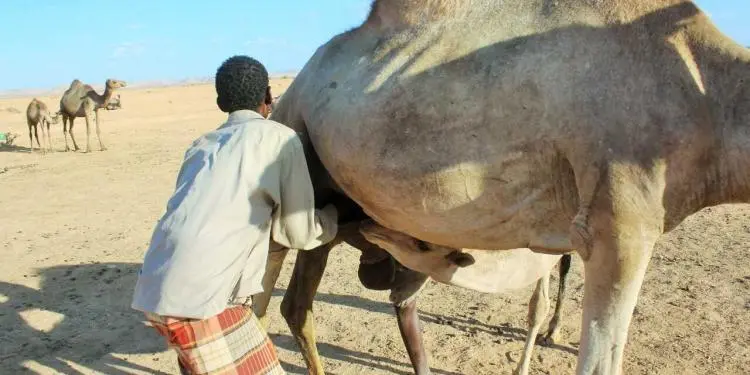
(ERGO) – Saleban Ali Abdi, a pastoralist living in the rural areas of Dollow, southern Somalia’s Gedo region, has vastly increased income from his camels after adopting a new method of raising his herd to produce a higher milk yield.
Three of his camels gave birth to young ones last December. Instead of his traditional routine of taking the animals out to graze every day, he started keeping them in an enclosure and feeding them on sorghum, maize among other grains.
He has noticed an improved production of milk leading to better sales. He is happy with the $7-9 daily profit that he has making since beginning milk sales in January.
“We get three meals a day, the children used to get one meal previously and our situation was hard. But since we got into the milk business we get all three meals. There has been prolonged drought in the area,” he said.
Saleban once owned a large herd of 60 camels and 180 goats, although prolonged drought with extremes in 2017 and 2021 took a heavy toll on his livestock. Only 30 camels survived the drought despite his best efforts to keep them alive.
With drought threatening his traditional livelihood, Saleban had tried working on construction sites but only managed to earn $10 or so on jobs that came up roughly twice a week. He couldn’t afford to buy food for his family and fodder for his camels, so took loans totaling $1,300.
The new milk business has enabled him to start repaying those loans. He sells largely to smaller traders serving Qurdubey IDP camp in Dollow.
“The profit we get from the milk is divided into two, we use a portion to buy food and water and the other portion goes to loan repayment,” he explained. He also saves $2 every day and estimates he will be able to buy a new camel every six months with the savings.
He is far less worried about drought and erratic weather patterns, as the health and value of his herd no longer depends on finding grazing in the rural areas.
Saleban has been advising other drought-hit pastoralists to revive their pastoralism lifestyle and adopt this method of zero-grazing that he had heard about from people living in the diaspora.
Around 10 other families in rural parts of Dollow have also adopted this new way of camel rearing, among them Hussein Barkhad Salad.
Hussein owns 50 camels, including seven that are currently producing milk. Milk sales are now bringing him a decent income that supports his wife and six children. He spends $6-7 a day buying seven sacks of grain needed to feed the camels and makes $14-16 profit every day.
Hussein has re-enrolled his four children in a local school after they were expelled due to three months of fee arears. He pays $10 for each child.
“I pay the children’s school fees, I also support my relatives, I also pay their education fees, be it Koranic lesson or secular classes,” he said proudly.
Hussein has been a pastoralist all his life and states that this is the most profitable time in his career. He hopes to increase the size of his herd of camels to produce more milk and gain higher income. His faith in livestock has been revied, he says, since discovering this new method of camel rearing.
Hussein sells his milk to businessmen like Abdullahi Mohamed, an IDP living in Qurdubey camp, who buys the milk at wholesale prices and sells it on to consumers within the camp.
“The pastoralists cannot reach all families in the camp, they don’t have the means to transport the milk to other areas, so this has become our work. While they [the pastoralists] are making good sales, we have also made profits from reselling the milk,” Abdullahi said.
Abdullahi joined Qurdubey camp in 2021 after losing of all his own herd of 170 goats. He is happy to have found a living from the milk sales that means his family of nine people can enjoy all three meals in a day.
He earns $10-15 from the milk sales and saves $5 every day. This patient businessman hopes to buy his own camel in a few months and return to livestock-rearing again, no doubt learning from the experiences of others with these new methods.
source: Radio Ergo

Leave a Reply